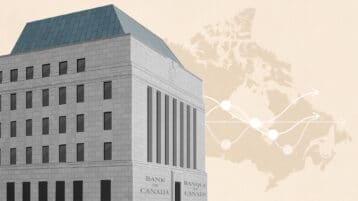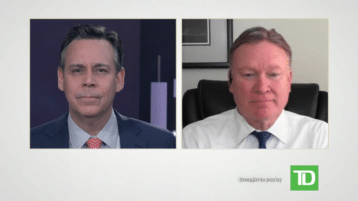Print Transcript
[music] >> Hello, I'm Greg Bonnell. Welcome to MoneyTalk Live, brought to you by TD Direct Investing. we have a special presentation for you today. We will be answering your previously submitted questions about tax planning and estate planning, so let's get right to it. It's been a tough year for investors with most major markets well off their highs and as we get to the final innings of the year, you might hear the term tax-loss selling or harvesting thrown around. Joining us now to discuss what it actually means and how to approach it, Nicole Ewing, Dir. of tax and estate planning at TD Wealth. Nicole, welcome to the program. >> Thank you. Great to be here. >> Perhaps people haven't done tax-loss selling before but this year it might give some people some opportunities. How do you approach that? >> Unfortunately, yes. It is so one thing about tax loss harvesting or tax-loss selling is essentially taking advantage of the opportunity to offset some losses again some games, so hopefully we had some gains as well and we are not just in a loss position, but we have the opportunity to essentially sell a stock that is not performed well and is less than its adjusted cost base in which case we have a loss. We can then sell that. We realize our loss. And we offset that against other gains. We can carry it back for three years, we can carry it forward indefinitely, but it's essentially a way of offsetting some of the poor performers against hopefully some other ones that have done better and reducing, then, ultimately, the tax that would been payable on those gains. >> So there is an opportunity therefore investors so depending on what account they are holding the investment in, we just started to get into the finery of it. I can get a little complicate. >> Well, it matters very much becausewe only want to do this, of course, in our nonregistered accounts. if we are trying to do tax-loss selling or harvesting in a registered account, on which we don't pay tax, we are not going to have the opportunity to use those losses against the gains, and we've essentially crystallized our loss and we don't have an opportunity to get those funds back again. So yes, we only want to be doing this in our nonregistered accounts, and there is a lot of potential things to think about, like what is your spouse doing? Is your spouse also selling? If so, you want to be aligned on that because there is rules called the superficial loss rules. And this essentially means if you sell a stock and reacquire it within 30 days, your loss will be avoided, it essentially won't be recognized. But we also have our, as married persons, if we have, if we are filing, we need to be cognizant of what our spouse has done because if we then, if they sell to crystallize their loss and we then by that same stock in our own portfolio within 30 days, we could potentially be offside and that's not a great plan. So we do need some coordination with this. It's not something to just take lightly. >> Right, I didn't know about that. How does this fit into a bigger strategy? Obviously, someone might have an equity portfolio and think, I can do this, but obviously holistically there's a lot more going on with someone's financial plan. > There is, so we always want to take that holistic perspective, we don't want to do things in isolation. It might seem like a great idea to do this, but if you are a business owner, for example, and you have a corporation with a positive capital dividend account balance that your accountant might be planning on doing some planning for you, you could undermine the under planning that you were other professionals are keeping in mind, so we do want to look at it holistically as part of an overall strategy. This is a good time to start thinking about it. We start getting a sense of what gains you will have for the the year. We do need to be mindful that this needs to be done before year end. So we don't want to wait until the very last minute because things have to go through the process. So be mindful of it now, gotta think about your overall strategy, think about where you hold your assets, what accounts they are in and what your other family member's are doing, and really look at it from a holistic plan. >> It will definitely be heading up against the end of December faster than we know. We are already talking about Halloween. So as we enter this final stretch of the year, it's been quite a year and quite a challenging year in many fronts. What other things would you be thinking about from a tax planning point of view? >> We want to be thinking about what we might be taxed on but also what we might be spending, and so if we need to be pulling out some income next year, is there an opportunity to do that in a more tax effective way by perhaps taking that income this year instead of next? And as an example, we could take out of our, if we know we are going to be accessing our TFS a account next year for whatever purchase, the contribution room will reset on January 1. So instead of taking those funds out of the first few weeks of January, if we instead do that in December, gives us the opportunity to have that contribution room at reset rather than needing to wait the entire year in order to do that. You know, charitable donations, course, at Thanksgiving, a lot of family singing about what they are grateful for, and that can often lead to discussions about charitable giving. It now is an ideal time to talk about that as well. If you do have stocks that have gains on them, if you are not doing the tax-loss selling strategy, you may want to donate those stocks with gains on them, which would eliminate the gain that you need to pay tax and you can get the full donation tax credit for the full amount of the stock. Oso lots of things to be thinking about and it's better to give yourself a little bit of runway to be able to do that. >> Going back to our university days and cramming it all in the night before do in the morning. Given the fact that it's been a challenging year, obviously, there are's long-term planning our horizons, investments around your financial and tax plans, this year has maybe rattled some people. As it's important to step back and say okay, this has been tough. When the longer term, what my trying to achieve? >> We want to have strategies that align with our goals and we have short-term goals and we have long-term goals and for many people, the long-term goals haven't changed even though the last couple of years has been tough. We want to have that perspective of what is it that we are doing and what impact that would have for the long run. So if, for example, instead of taking the money out of our TSA, we took it out of our RRSP, we've now lost that opportunity to contribute those funds in the future. We've lost all of that tax-sheltered growth that we would've had the opportunity to have. So certainly, we do want to be stepping back and looking at what is it that we are trying to achieve? What's most important to us? And what do we need to, what information do we need to make better decisions? Because this is not, this is complex stuff and most people don't have a fulsome idea of the tax act or, you know, what legislation might be coming down. So it's great to really do your research and make sure that you understand what the fulsome implications of any decisions that you are making. >> Fascinating stuff and a great start to the show. We are going to get your questions about tax and estate planning for Nicole Ewing in just a moment's time. When our programming, Thursday, Haining Zha, portfolio management aat TD Asset Management will be our guest taking at your questions about the Chinese economy and markets. A reminder, course, you can get in touch with us at any time. Do you have a question about investing or what's driving the markets? Our guests are eager to hear what's on your mind so send us your questions. There are two ways you can get in touch with us. You can send us an email anytime at moneytalklive@td. com will or you can use the question box right below the screen here on WebBroker. Just write in your question and hit send. We will see if one of our guests can get you your answer right here on MoneyTalk Live. We are back now with Nicole Ewing, we are taking your previously submitted questions and answering them about tax and estate planning, so let's get to them. question number one. My question is when the first time home buyers plan. In order to take advantage of the HBP, those the money in my RRSP and need to be in cash or can I keep my stocks and use them as collateral? I haven't heard this one before. >> So just to be clear, we are talking about thefirst time homebuyers plan that exists for 35,000 which you can take out of your RRSP and re-contribute over the next 15 years. This is different, of course, then some of the other tax savings accounts and other… >> Over the past couple of years, the government been trying a lot of different things. >> So we are talking about this plan though, yes, there is a form that needs to be submitted. T 1036 I believe. We can't use leverage strategy is, which would be great, but no. We do need to take those funds out and use them towards the home. >> It was creative thinking though. I use the homebuyers plan when I got into the market in 2002. I didn't think that was an option available to me. An interesting one indeed. Let's get to another question could easily submit it by the audience. I'm a Canadian investor and I own shares of the US firm. They issue a K1 form as part of the shareholder for tax purposes. Now I have all this equity in my RRSPs. Is it necessary for me to complete this form? >> Okay, so I'm not going to tell anybody whether or not they need to complete forms. The best advice, course, is to work with your accountant to determine what applies to you. These forms generally, if you are investing to your RRSP, generally speaking, and if you are not otherwise required to file a US tax return, no. But there is a lot of, is it a corporation, is it a partnership, is it coming through an estate? Why are you getting the K1 form? I would suggest that if you have concerns or questions about whether it needs to be filedto speak with a US tax advisor. >> That's always important to know, your actual situation and what you are facing in terms of what your obligations are ultimately going to be. >> This is the IRS, this is not Canada, so we need to make sure that we understand those rules as well. >> Okay, great set. I have an estate question from one of our viewers. If my husband predeceases me, will the house title pass to me or is it deemed part of his estate and must go through probate? My name is not on the house deed, the house deed is in my husband's name only. We live in Ontario and I paid half the mortgage and the mortgage is fully paid off. We got a few things going on here. I have to write this one down. >> Okay. So again, generally speaking, if you are not on title to the home and your husband passes away, the property will need to go through probate. Well, I will pause for a second. When we say probate, there's a couple of different ways that term is used. So it can, in one sense, be the administrative process of ensuring that the executor has the authority to act on behalf of the estate involving the instructions of the will. Probate is the acknowledgement that they have that authority throughout court process. Usually, though, what people are really concerned about what probate is the estate administration tax in Ontario or probate tax, probate fees, the language is different in different provinces. So usually, that's what people are trying to avoid. Generally speaking, if you are not on the title, the property will need to go through probate. There is, depending on how long the property has been held, there are these old rules that if it's a first dealing on this property since the change of the registry system in Ontario, then you do not need to get probate. So again, speaking was an estate lawyer who can advise on whether or not you actually need to get probate for that property and whether you need it for anything else can be a bit complex. But you can, you know, it's definitely worth while to think about adding your name to the title. >> I was going to ask about that. Some people might think as they get later on, it sounds like at this point the mortgage is paid off, they've been in this home for a while, maybe sort of change the rules of the game a little bit? >> Again, it is so dependent on the individual circumstances because if it might be… This property will flow through the will of the individual who owned it, so depending on what his will says, she may or may not be the beneficiary of that property even though she's… It's the matrimonial home that they live in. So we need to be very careful that we understand what rights we have to property, if you are a married spouse, which province you are in. You may or may not have property rights. If your common law, for example, depending on, again, which province you are in, I would say it is always best if the goal is to avoid needing to go through the probate process on the death of the first spouse, there's a lot of really great things that can be done such as, you know, adding names to joint title, but you want to do that, again, in the context of the overall planning. So you want to make sure, if this is a seconds by situation, that is not the intention the baby the house is supposed to go to the kids from the first marriage and probate is going to be the least of the concerns in the family. >> Not everyone family situation is the same either. >> People assume, too, if I don't have a will it's fine, everything goes to my spouse, that is not the case. There are rules in each province that give a preferential share to each spouse, see you get X number of dollars to start, and then the rest of the estate is going to be divided up. So depending on how much money is in the estate, whether other properties owned, we may need to sell the home in order to give the other beneficiaries their entitlement so worthwhile, looking at it, understanding what you want to have happen, what documents you have in place and what will happen based on those and to the extent that there is any gaps, let's take the steps to get that started. >> All right, definitely important, considering the value of real estate and a lot of people's personal wealth. >> It significant. > Significant indeed. Another question here. Are there any big rule changes that impact estate planning that we should be made aware of? This is a key one. The rules change. >> They do change, they are constantly changing and when we think about estate planning, we are thinking about not only the estate rules, we are thinking about family law rules, tax rules, corporate rules. There's a lot to be aware of. I think a big one that people are talking about now is the change in the trust reporting rules. Now, this is originally announced it was going to be effective in 2021. The amendments came out this August and we are fully expecting these new trust reporting rules to be in effect for tax years ending after December 31, 2022 and what they say, it's quite significant, is that you must report the settler, the individual who created the trust, the trustees, the beneficiaries, contingent beneficiaries, so those who might not even realize they have an interest in the trust. It also applies to bare trusts, which were started to be used by many people to partly avoid probate. That's one of the strategies in Ontario that is used. So we want to be… If you have a family trust, if you are the trustee of a trust, if you have an in trust account or a bear trust, all of those are potentially going to be impacted by these new rules. There's not a lot of exceptions. There are some. So if it's a new trust under three months, it won't apply. If it's shares and investments in cash less than 50,000, it won't apply. But if, for example, you have a cottage trust, again, less people do this, we will put the cottage in the trust and it's a great way to pass it on to the next generation, perhaps there was a freeze at some point, going forward, the trustees will have an obligation to report and file these returns and if they don't, the penalty for noncompliance with this is the greater of $2500 or 5% of the fair market value. >> The greater of? >> The greater of. > That could be a big amount of money. >> Were talking about these cottages, again, we have a $3 million cottage in a trust like this, if the trustee wasn't aware of their obligations here, it could be quite expensive to find out. There's a lot of uncertainty, a lot of questions that people have about compliance, the form that needs to be completed has not been issued so there's a lot of question about it but it's something people should have on their radar, I would say. >> Definitely an important one. We are going to get back to your questions for Nicole Ewing on taxes and estate planning in just a moment time. Always make sure to do your own research before you make any investment decisions. When programming note, on Friday show, we will be talking with TD Securities Bart Malek about the commodities space. If you've got a question, here's how you can get in touch with us. Do you have a question about investing or what's driving the markets? Our guests are eager to hear what's on your mind so send us your questions. There are two ways you can get in touch with us. You can send us an email anytime at moneytalklive@td.com or you can use the question box right below the screen here on WebBroker. Just write in your question and hit send. We will see if one of our guests can get you your answer right here at MoneyTalk Live. We are back now with Nicole Ewing, taking your questions about tax and estate planning. Let's get to them. I've been asked to designate a beneficiary in connection with one of my financial accounts. What should I be thinking about when making this decision? >> Oh, I love that you're pausing to ask what you should be thinking about when making this decision because, for many people, this is sort of an automatic thing. Somebody had to the foreman you just sign it. So beneficiary designation is, you would have those on our registered accounts, to FSA's, RSP's, we have them on insurance policies as well. And what's important to recognize is that the format that the financial institution gives you to complete is a contract with terms that you will be held by even if you didn't really understand what they were. That sounds okay, except each financial institution has its own contract with its own interpretive language. So I will give you an example of something that surprises most people. If I have an RSP at one financial institution and in RSP at another financial institution and I named the exact same beneficiaries on these forms, Sam going to divided equally amongst my two children, and one of my children predeceases me, what happens to the share that was intended for them, it's going to be dictated by this form that I signed when I opened my account and quickly signed. If that one financial institution, the form might say, if they predecease, they share goes to the surviving beneficiary, everything goes to whoever is left. Another form may say that they share goes back to my estate to be dealt with under my will or could go to the individual's estate, to their next of kin. unless you've actually read the documentation to know how that will be interpreted, you just don't know what will happen. So a lot of people will address this in their wills. They will have beneficiary designations in the wills. The important thing to be aware of there is that a will is interpreted from the date of death, generally speaking, and speaks to what assets you own at the date of death, and RSP only speaks to day of signing, sorry, not only speaks, speaks from the date of signing. So depending if you've done your will and then you go to the financial institution and you do a new form that can override some of the other planning that you've done. So my very long way of saying this is not… >> Read the fine print, right? >> Read the fine print. It should not be a casual decision that you're making. Really understand what the language means and whether it makes sense to do your designations on the form or whether an estate planning lawyer can help you crass language that better suits your circumstances. >> What always strikes me about this kind of planning and really encompasses, you know, the whole spectrum of life from beginning to the end and everything in between, I think that some of the, you know, designations that I've signed for beneficiary, depending on what account it was, I've always defaulted to my spouse and then it will say revocable or your revocable? And that's quite the question, isn't it? That's quite the question. >> That means something. That is not casual language. And when we think about the repercussions of what does it mean? So when I signed a beneficiary form, what I've said is, this asset is not going to be dealt with by my will. It's not going to go to my state. It's not going to be available to pay any taxes that I may oh, instead, it's a stand-alone asset is going to flow directly to the individual that I named. Which, again, people do to avoid probate but if you are in a situation where you only have that, you know, your RSP and your cottage and you want to pass the cottage onto the kids and and RSP onto the spouse, the spouse may or may not play ball. There may be tax payable on that that then needs to be paid for from the other assets of the estate. So we want to do the coordination, we want to understand where the tax is going to apply to this as well. It's amazing to me, I was speaking with a very sophisticatedcouple just last week I didn't appreciate that the RRSP is going to be collapsed on death and included in their income in its totalityin year of death. And so meaning that you gotta pay tax on the full amount, and we can't assume that people understand what's going to happen for some things that we might take for granted. So your parents may have lovingly thought, I'm going to name US beneficiary, make sure you speak with them and understand whether that makes sense for them, whether they should actually, you know, pay the probate fees but have those funds going into the estate to be dealt with more appropriately, maybe it's going to go into a trust, maybe it's going to be divided in a different way, maybe it needs to be available to pay tax, but yeah, these are big decisions. >> Important stuff indeed. Let's get to this next question. This one might be a little scandalous to you considering what you do or for a living. I've always meant to get a will but have kept putting it off. When I finally getting around to it, which I consider? Where do I start? some people put this off way longer than they should. >> 50% is still the number and unfortunately that applies to lawyers as well,who should know better. but that's great. Congratulations that you've recognize the importance of having this document in place. It's a great place to start. Think about what you own. Gathering all your documents together, understanding where your accounts are, whether or not you have beneficiaries named on them, doing essentially a net worth statement. Let's call it all in, look at what assets you own. There are professionals out there, I say depending on the complexity of your state, to the extent it's complex in any way, working with a lawyer who specializes in this area is critical. There is, you know, do-it-yourself wills which I don't recommend and there's people who might not have the expertise. So there's the Society of trust and estate practitioners, an organization where it has a list of lawyers who specialize in planning. It's a great resource. I'd say asking any of your other advisors, so if you have a financial advisor or a lawyer that you've worked with for the purchase of your home, ask them. But go prepared and go having thought about some of these questions. So who will your estate executor be? Who is the person that is going to deal with all this for you, administer? If you have young children, great opportunities to talk about who the guardians might be. These are the questions that you're going to be asked, and a lot of the law firms will have questionnaires that they want you to fill out before you come to that initial meeting. So it's not even a bad idea to scan a few of those and get a sense of the types of questions that you're going to be asked. >> Define that perhaps, as Canadians, we are so exposed to American media growing up, watching American TV shows about how the system works, are there misconceptions in the country about what a will is and how will can change and how will get executed? >> Oh, sure, sure. And very different planning in the US and Canada. Trusts are a big saying, and so a lot of families in the US would use trusts to transfer their wealth as opposed to wills and we don't do as much of that. We don't have all the different types of trusts that they do in the US. We do have some other really great ones that they don't have. So we have alter ego trusts and joint partner trusts which are excellent vehicles that can be used to transfer wealth onto the next generation outside of a will,, so there are some tools that we have that they don't have. I think what's uniquely interesting about Canada is each of our provinces has its own rules with respect to estates and how things will be interpreted. It also has its own courts that will rule, perhaps, differently in one province than they would in another. So for example, in Ontario, testamentary freedom is really paramount and, generally speaking, I can leave my assets to whomever I like and not leave assets to whomever I like. I can leave everything to charity and that's fine. In other provinces, so in BC, for example, there is a much different approach to it. Some people would call it a moral obligation to leave assets to children and it's not unusual for there to be court cases about people who were written out of wills and what their entitlements might be, and so not only the differences in the US, but even if you were raised in Canada, and one province, and have relocated to another, you may have very, very different outcomes than what you may expect. >> Fascinating stuff. Let's get to another question that was sent in I had of the show. We helped one of our adult children get into the housing market. With rates on the rise and home prices under pressure, are the things I should be concerned about? >> Yes! >> Yes, next question. Okay. >> Well, firstly, we would want to really understand how the parents contributed. So how did the individual help their kids? Was this a gift? Was it a loan? Was it a guarantee, did they sign onto the mortgage? And the things to think about would be different in each of those circumstances. So if you have gifted, I would hope that it's been documented. I would hope there has been a deed of gift or something created when that gift was made and if it was a gift and you are now wanting to document it, you might want to consider doing that as well. That is important for family law reasons. Important for tax reasons, to know where the funds came from. If it was a loan, are you now thinking differently about the repayment terms then you may have been thinking before? Firstly, do you need the funds yourself to be funding your own cost of living which has gone up for everyone? Do you need to have a discussion with your kids about the expectations where perhaps… Are you still aligned on what these expectations are? And we are seeing children whose mortgage payments may have increased significantly no longer in the position to, perhaps, repay mom or dad or may even need additional funds. And so what do we do there? Are we going to just continue to help out with the kids? I think if you do that, it should be part, again, of an overall strategy. so if we are helping one child and not the other, do we want to equalize in the will? Perhaps think about what assets the other child will get? Probably want to write it down somewhere so that we have a list of gifts and loans that have been made. I think it's important to think about what happens if something, you know, if you've guaranteed the debt, for example, what happens if something happens to you? Your state is likely still going to be on the hook for needing to guarantee that debt, so you might want to think about insurance, mortgage insurance to pay the cost of that, perhaps your adult children would like to fund the premiums to make sure that if something happens to you, you are able to have those funds paid back. But there's a lot, I think, to think about and it's important, again, to not take for granted that maybe some of the original conversations were different than they would be now as we have seen in some regions prices dropping and maybe the property isn't worth what we paid for just a year ago and the parents need to be, you know, aware of if it's a loan, if they expect to get anything back to the property, let's have a conversation about it. >> Yeah, the math has changed a lot of fronts. Here's an interesting one considering the cost-of-living pressures you were just talking about. Heading into the holidays, I'm hoping to try to keep my spending and check more than previous years. Any suggestions? >> Well, it's a good question. And again, I'm glad, it's an important question when the tapping early enough, I think, that we can maybe do some planning for it. So we had a conversation in my family over the weekend about what are the expectations for holidays this year? It's a little bit different and we don't want anybody feeling obligated to be buying presents and paying for things that they simply can't afford this year. So having a conversation with those who you'll be spending the holidays with, maybe change some of the traditions in a way that we are not doing big gifts this year, but we are all going to do… Write a poem to each other, we will do a family photo, you know, there's other things that don't cost as much. But I would encourage you to get on the same page with those that you are giving and receiving from. >> When you give someone something big,… You get into a strange spiral trying to impress each other. >> For many people, this is a time when significant debt is acquired and debt is more expensive for many people than it was previously, so that calculation, again, about how willing you are to extend yourself beyond your comfort zone, oh, I'll catch up in January, February, March, that might be a little bit different heading into this year. >> The stuff of life indeed, Nicole. A real pleasure having you here. I hope you come back to him. >> I hope so as well. >> Nicole Ewing, director of tax and estate planning at TD Wealth. That's all we have for the show today. Thanks for watching. We will see you tomorrow. [music]



























